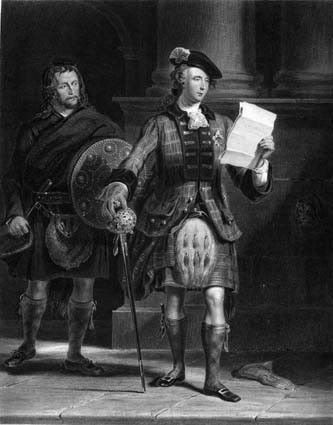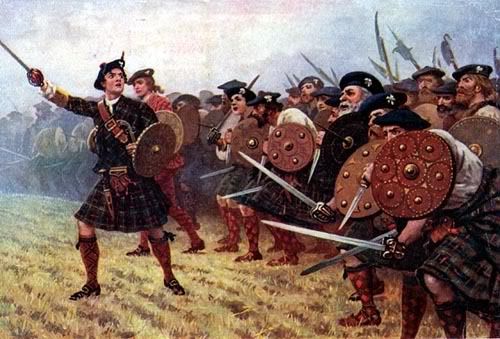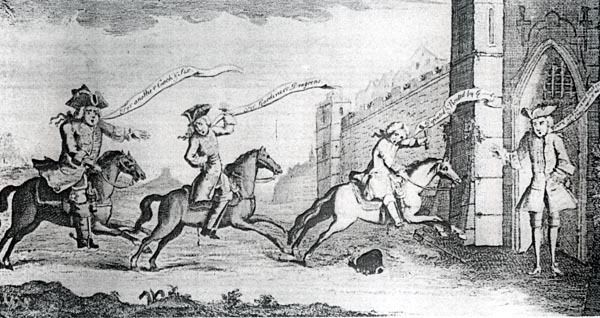Johnnie Cope / Battle Of Tranent-Muir Or Of Preston-Pans

(На фото: принц Чарли (справа) подбирает упавшую челюсть, получив известие о том, что за его голову назначена награда в 30,000 фунтов)
Ewan MacColl - Johnnie Cope:
Archie Fisher, Barbara Dickson, John MacKinnon - The Battle of Prestonpans:
The Corries - Johnny Cope:
Alex Campbell - Johnny Cope:
Hamish Imlach - Jonny Cope:
Jean Redpath - Johnnie Cope:
Planxty - Johnny Cope:
Nigel Denver - Johnnie Cope:
Так получилось, что песня про английского генерала Джона Коупа оказалась сверхпопулярна (внутри фолк-сообщества, разумеется). Профессор Чайлд пишет, что с большой вероятностью можно утверждать, что песню написал Адам Скирвинг - "умный и состоятельный фермер, отец Арчибальда Скирвинга, художника-портретиста". В современных источниках об этом же утверждается с завидной прямолинейностью, но Чайлд был уверен не до конца. В чем Чайлд был уверен - так это в том, что Адам Скирвинг написал другую песню, повествующую о тех же событиях - "Battle Of Tranent-Muir Or Of Preston-Pans". Эта последняя довольно аккуратно повествует о событиях, произошедших 22-го сентября 1745-го года. У меня нашелся только один ее вариант.
А вот песню "Johnnie Cope" пели, и поют, все кому не лень. И это, к сожалению, бросает тень на достойного джентельмена Джона Коупа, поскольку песня представляет из себя наглый и безосновательный поклеп.
В 1745-м году произошла битва у деревни Preston-Pans. Бились шотландцы под командованием (bonnie) принца Чарли (увековеченного в сотнях песен) и армия короля Георга II, которую возглавлял генерал Джон Коуп. Это была одна из первых битв восстания якобитов и она закончилась сокрушительным поражением англичан.

Про битву я много рассказывать не буду, это довольно знаменитое событие, описанное подробно и много раз. Будете в Эдинбурге - прогуляйтесь на экскурсию. Есть даже сайт, посвященный битве.
Армия англичан к моменту битвы представляла из себя плачевное зрелище. И драгуны, и пехота были неопытны и недостаточно тренированы. Артиллерия была составлена из инвалидов и моряков под предводительством одного старого артиллериста. Вся эта команда просто в панике разбежалась при виде шотландцев. Причем, поскольку они были окружены с трех сторон, то убежать удалось мало кому. 300 англичан были убиты, 500 ранены, полторы тысячи взято вплен. Сбежали 170 человек. У шотландцев было 30 убитых и 70 раненых.
Возвращаясь к песне "Johnnie Cope": содержащиеся в ней сведения о том, что генерал Коуп сбежал с поля боя раньше всех, являются чистым вымыслом. Позже военный трибунал полностью восстановил честь генерала Коупа, заявив, что тот сделал все, что было в его силах. Это генерал был брошен армией, а не наоборот.
Но, тем не менее, прискорбный факт того, что генерал Коуп был вынужден сам сообщать генералу Лорду Марку Керру о поражении, вымыслом не является. Говорят, Лорд Керр заявил Коупу, что тот - первый генерал в истории, который сам принес известие о своем поражении.
Гравюра того времени: "Сэр Джон Коуп прибывает в Berwick чтобы объявить о поражении у Prestonpans":

Да, еще одно. Письмо, о котором поется в самом первом куплете - письмо генерала Коупа к принцу Чарльзу, посланное перед битвой, похоже действительно существовало. На картине сверху принц (по замыслу художника) действительно читает то самое письмо. Я там пошутил, что принц вычитал в письме про награду за его голову. Так и было написано на одном сайте. Тем не менее, это вряд ли. Мне так и не удалось узнать, что было написано в письме, но касаемо награды... извольте посмотреть документ. Там аккуратно, по дням, расписана жизнь принца. Из этого документа следует, что принц узнал о награде за свою голову еще 22-го августа, т.е. за месяц перед битвой. И кстати принц, не будь дураком, тут же назначил награду за голову Георга II. Короля он оценил в 30 фунтов.
* * *
Тексты двух песен:
Johnnie Cope
Hey, Johnnie Cope, are ye wauking yet?
Or are your drums a-beating yet?
If ye were wauking I wad wait
To gang to the coals i' the morning.
Cope sent a challenge frae Dunbar:
'Charlie, meet me an' ye daur,
An' I'll learn you the art o' war
If you'll meet me i' the morning.'
When Charlie looked the letter upon
He drew his sword the scabbard from:
'Come, follow me, my merry merry men,
And we'll meet Johnnie Cope i' the morningl
'Now Johnnie, be as good's your word;
Come, let us try both fire and sword;
And dinna rin like a frichted bird,
That's chased frae its nest i' the morning.'
When Johnnie Cope he heard of this,
He thought it wadna be amiss
To hae a horse in readiness,
To flee awa' i' the morning.
Fy now, Johnnie, get up an' rin;
The Highland bagpipes mak' a din;
It's best to sleep in a hale skin,
For 'twill be a bluidy morning.
When Johnnie Cope tae Dunbar came,
They speired at him, 'Where's a' your men?'
'The deil confound me gin I ken,
For I left them a' i' the morning.
'Now Johnnie, troth, ye werena blate
To come wi' news o' your ain defeat,
And leave your men in sic a strait
Sae early in the morning.
'I' faith,' quo' Johnnie, 'I got sic flegs
Wi' their claymores an' philabegs;
If I face them again, deil break my legs!
Sae I wish you a' gude morning'.
Battle Of Tranent-Muir Or Of Preston-Pans
The Chevalier, being void of fear,
Did march up Birsle brae, man,
And through Tranent ere he did stent,
As fast as he could gae, man;
While General Cope did taunt and mock,
Wi' mony a loud huzza, man,
But ere next morn proclaim'd the cock,
We heard anither craw, man.
The brave Lochiel, as I heard tell,
Led Camerons on in clouds, man;
The morning fair, and clear the air,
They loos'd with devilish thuds, man.
Down guns they threw, and swords they drew,
And soon did chase them aff, man:
On Seaton crafts they buft their chafts,
And gart them rin like daft, man.
The bluff dragoons swore, blood and oons!
They'd make the rebels run, man:
And yet they flee when them they see,
And winna fire a gun, man.
They turn'd their back, the foot they break,
Such terror seiz'd them a', man.
Some wet their cheeks, some fyl'd their breeks,
And some for fear did fa', man.
The volunteers prick'd up their ears,
And vow gin they were crouse, man!
But when the bairns saw't turn to earn'st,
There werena worth a louse, man.
Maist feck gade hame, O fie for shame!
They'd better staid awa, man,
Than wi' cockade to make parade,
And do nae gude at a', man.
Menteith the great, when hersel shit,
Un'wares did ding him owre, man,
Yet wadna stand to bear a hand,
But aff fu fast did scour, man,
O'er Sourtra Hill, ere he stood still,
Before he tasted meat, man.
Troth, he may brag of his swift nag,
That bore him aff sae fleet, man.
And Simpson, keen to clear the een
Of rebels far in wrang, man.
Did never strive wi' pistols five,
But gallop'd wi' the thrang, man.
He turn'd his back, and in a crack
Was cleanly out o' sight, man,
And thought it best: it was nae jest,
Wi' Highlanders to fight, man.
'Mangst a' the gang, nane bade the bang
But twa, and ane was ta'en, man;
For Campbell rade, but Myrie staid,
And sair he paid the kane, man.
Four skelpe he got, was waur than shot,
Frae the sharp-edg'd claymore, man;
Frae mony a spout came running out
His recking het red gore, man.
But Gard'ner brave did still behave
Like to a hero bright, man;
His courage true, like him were few
That still despised flight, man.
For king, and laws, and country's cause,
In honour's bed he lay, man.
His life, but not his courage fled,
While he had breath to draw, man.
And Major Bowle, that worthy soul,
Was brought down to the ground, man;
His horse being shot, it was his lot
For to get mony a wound, man.
Lieutenant Smith of Irish birth,
Frae whom he call'd for aid, man,
But full of dread, lap o'er his head,
And wadna be gainsaid, man.
He made sic haste, sae spurr'd his beast,
'Twas little there he saw, man;
To Berwick rade, and falsely said
The Scots were rebels a', man.
But let that end, for weel 'tis kend
His use and wonts to lie, man.
The Teague is naught, he never fought
When he had room to flee, man.
And Cadell, drest, amang the rest,
With gun and gude claymore, man,
On gelding gray he rode that day,
With pistols set before, man.
The cause was good, he'd spend his blood
Before that he would yield, man;
But the night before he left the core,
And never fac'd the field, man.
But gallant Roger, like a soger,
Stood and bravely fought, man;
I'm wae to tell, at last he fell,
And mae down wi' him brought, man.
At point of death, wi' his last breath,
Some standing round in ring, man,
On's back lying flat, he wav'd his hat,
And cried, 'God save the king!' man.
Some Highland rogues, like hungry dogs,
Neglecting to pursue, man.
About they fac'd, and, in great haste,
Upon the booty flew, man.
And they, as gain for all their pain,
Are deck's wi' spoils of war, man;
Fu' bauld can tell how her nain sel
Was ne're sae praw before, man.
At the thorn tree, which you may see,
Bewest the meadow mill, man,
There mony slain lay on the plain,
The clans pursuing still, man.
Sic unco hacks, and deadly whacks,
I never saw the like, man;
Lost hands and heads cost them their deads,
That fell near Preston dyke, man.
That afternoon, what a' was done,
I gade to see the fray, man;
But I had wist what after past,
I'd better staid away, man:
On Seaton sands, wi' nimble hands,
They pick'd my pockets bare, man;
But I wish ne'er to dree sic fear,
For a' the sum and mair, man.